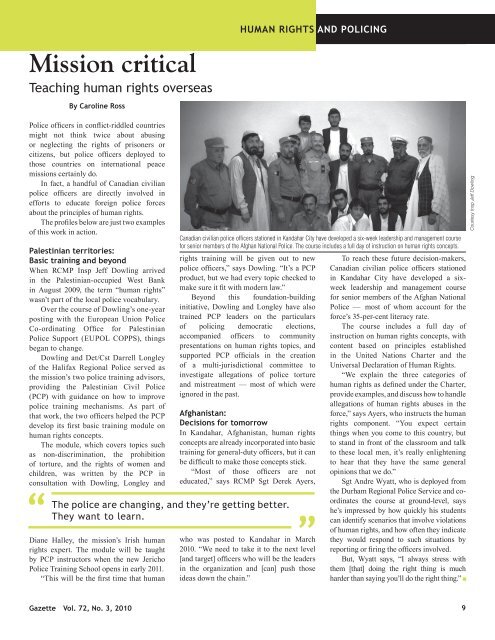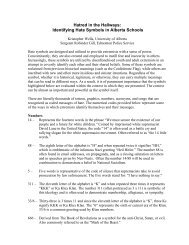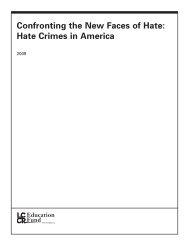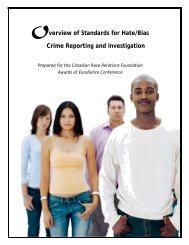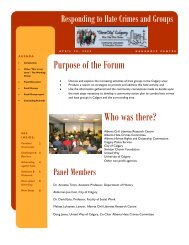RCMP Gazette Human Rights and Policing - Alberta Hate Crimes ...
RCMP Gazette Human Rights and Policing - Alberta Hate Crimes ...
RCMP Gazette Human Rights and Policing - Alberta Hate Crimes ...
You also want an ePaper? Increase the reach of your titles
YUMPU automatically turns print PDFs into web optimized ePapers that Google loves.
Mission criticalTeaching human rights overseashuMAN RiGhTS AND POliCiNG<strong>RCMP</strong> COVERby Caroline RossPolice officers in conflict-riddled countriesmight not think twice about abusingor neglecting the rights of prisoners orcitizens, but police officers deployed tothose countries on international peacemissions certainly do.In fact, a h<strong>and</strong>ful of Canadian civilianpolice officers are directly involved inefforts to educate foreign police forcesabout the principles of human rights.The profiles below are just two examplesof this work in action.Palestinian territories:basic training <strong>and</strong> beyondWhen <strong>RCMP</strong> Insp Jeff Dowling arrivedin the Palestinian-occupied West Bankin August 2009, the term “human rights”wasn’t part of the local police vocabulary.Over the course of Dowling’s one-yearposting with the European Union PoliceCo-ordinating Office for PalestinianPolice Support (EUPOL COPPS), thingsbegan to change.Dowling <strong>and</strong> Det/Cst Darrell Longleyof the Halifax Regional Police served asthe mission’s two police training advisors,providing the Palestinian Civil Police(PCP) with guidance on how to improvepolice training mechanisms. As part ofthat work, the two officers helped the PCPdevelop its first basic training module onhuman rights concepts.The module, which covers topics suchas non-discrimination, the prohibitionof torture, <strong>and</strong> the rights of women <strong>and</strong>children, was written by the PCP inconsultation with Dowling, Longley <strong>and</strong>Diane Halley, the mission’s Irish humanrights expert. The module will be taughtby PCP instructors when the new JerichoPolice Training School opens in early 2011.“This will be the first time that humanrights training will be given out to newpolice officers,” says Dowling. “It’s a PCPproduct, but we had every topic checked tomake sure it fit with modern law.”Beyond this foundation-buildinginitiative, Dowling <strong>and</strong> Longley have alsotrained PCP leaders on the particularsof policing democratic elections,accompanied officers to communitypresentations on human rights topics, <strong>and</strong>supported PCP officials in the creationof a multi-jurisdictional committee toinvestigate allegations of police torture<strong>and</strong> mistreatment — most of which wereignored in the past.Afghanistan:Decisions for tomorrowIn K<strong>and</strong>ahar, Afghanistan, human rightsconcepts are already incorporated into basictraining for general-duty officers, but it canbe difficult to make those concepts stick.“Most of those officers are noteducated,” says <strong>RCMP</strong> Sgt Derek Ayers,The police are changing, <strong>and</strong> they’re getting better.“They want to learn.Canadian civilian police officers stationed in K<strong>and</strong>ahar City have developed a six-week leadership <strong>and</strong> management coursefor senior members of the Afghan National Police. The course includes a full day of instruction on human rights concepts.“who was posted to K<strong>and</strong>ahar in March2010. “We need to take it to the next level[<strong>and</strong> target] officers who will be the leadersin the organization <strong>and</strong> [can] push thoseideas down the chain.”To reach these future decision-makers,Canadian civilian police officers stationedin K<strong>and</strong>ahar City have developed a sixweekleadership <strong>and</strong> management coursefor senior members of the Afghan NationalPolice — most of whom account for theforce’s 35-per-cent literacy rate.The course includes a full day ofinstruction on human rights concepts, withcontent based on principles establishedin the United Nations Charter <strong>and</strong> theUniversal Declaration of <strong>Human</strong> <strong>Rights</strong>.“We explain the three categories ofhuman rights as defined under the Charter,provide examples, <strong>and</strong> discuss how to h<strong>and</strong>leallegations of human rights abuses in theforce,” says Ayers, who instructs the humanrights component. “You expect certainthings when you come to this country, butto st<strong>and</strong> in front of the classroom <strong>and</strong> talkto these local men, it’s really enlighteningto hear that they have the same generalopinions that we do.”Sgt Andre Wyatt, who is deployed fromthe Durham Regional Police Service <strong>and</strong> coordinatesthe course at ground-level, sayshe’s impressed by how quickly his studentscan identify scenarios that involve violationsof human rights, <strong>and</strong> how often they indicatethey would respond to such situations byreporting or firing the officers involved.But, Wyatt says, “I always stress withthem [that] doing the right thing is muchharder than saying you’ll do the right thing.” ▪Courtesy Insp Jeff Dowling<strong>Gazette</strong> Vol. 72, No. 3, 2010 9


